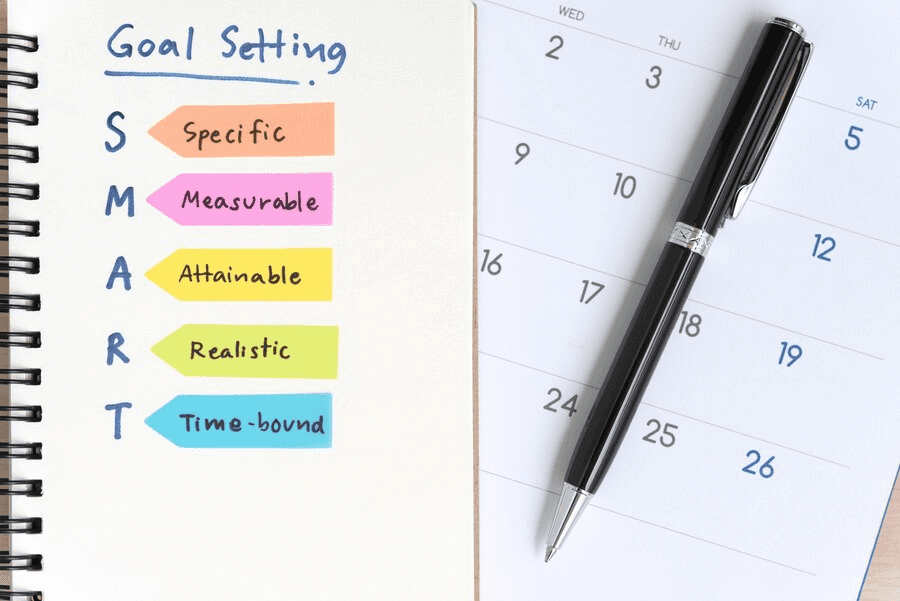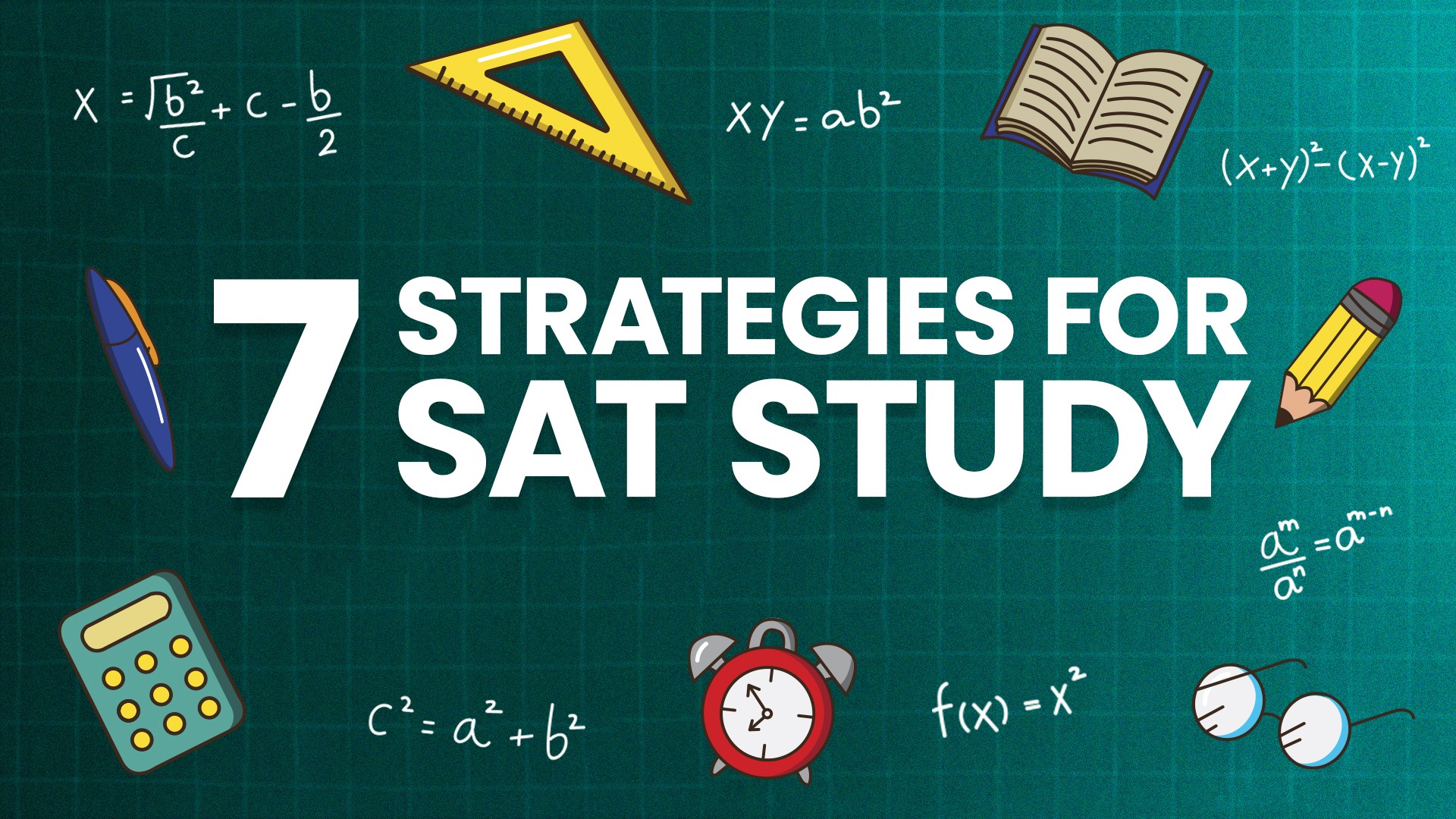Are you preparing for the SATs, aiming to score your best?
Research shows that students who follow a structured study plan are 75% more likely to achieve their target scores than those who study haphazardly.
Studying planning is not just about organizing your time; it is about creating a schedule aligned with your goals and strengths to help you achieve the best.
Do you ever feel that you are walking confidently into the exam hall, knowing you are well prepared? A well-structured study schedule can help you achieve just that.
In this blog, we will explore seven proven strategies to optimize your SAT preparation that will help you focus on areas that need improvement and reinforce what you already know
Ready? Let’s get started!
1. Setting SMART Goals for SAT Preparation
SMART goals are Specific, Measurable, Achievable, Relevant, and Time-bound objectives that help you achieve your goals in a structured way.

Specific: Clearly define what you want to achieve. For example, instead of "improve SAT scores," specify which sections and by how much.
Measurable: Establish criteria to track progress. For instance, aiming to increase your Math section score by 50 points provides a measurable target.
Achievable: Set realistic goals based on your current abilities and resources. Your goals must stretch you without being unattainable.
Relevant: Ensure your goals align with your overall SAT preparation strategy and ultimate score objectives.
Time-bound: Assign deadlines to create urgency and focus. For example, aiming to achieve your target scores within a specific timeframe keeps you accountable.
Benefits of SMART Goals in SAT Preparation:
Clear and specific goals improve your focus by giving you a clear target to aim for. When you know exactly what you want to achieve, you are more likely to stay motivated throughout your study sessions.
2. Creating an SAT Study Schedule
A well-structured study plan helps you make the most of your study time by helping you focus on your main goals and outcomes of the SAT. It helps you systematically cover all topics of the SAT as you are creating this schedule based on your learning style because you know what matters most to you.
Tips for Creating an Effective Study Schedule:
Identify subjects or question types where you struggle the most. Devote additional study time to these areas to strengthen your understanding and skills.
Break down complex topics into manageable parts for easier comprehension.
Focus on reviewing high-yield content areas frequently tested on the SAT, such as grammar rules in Writing and essential concepts in Math.
Practice solving SAT-style questions within time constraints to improve your pacing and accuracy during the actual exam.
3. Proven Study Techniques
Active Learning: Actively engage with the material rather than passively reading or listening. This can involve summarizing key concepts in your own words, teaching someone else, or applying what you’ve learned to solve problems or explain ideas. By actively participating in the learning process, you reinforce understanding and retention.
Spaced Repetition: This technique involves reviewing information at gradually increasing intervals. It leverages the spacing effect, which suggests that information is better retained when studied repeatedly over spaced intervals rather than in one single session. Spaced repetition is particularly effective for memorizing facts, formulas, and vocabulary.

How Different Study Techniques Cater to Various Learning Styles:
Visual Learners: Visual learners benefit from using diagrams, charts, graphs, and other visual aids to organize information spatially. Color coding and mind-mapping techniques can help them visualize relationships between concepts.
Auditory Learners: These learners absorb information best through listening and speaking. They may benefit from recording lectures or study notes and listening to them later. Engaging in group discussions or explaining concepts verbally can also reinforce learning.
Kinesthetic Learners: Kinesthetic learners learn best through hands-on activities and movement. Writing notes by hand, using interactive study tools, and participating in activities that involve physical movement can help reinforce their understanding and memory.
4. Managing Time Effectively During the SAT
Importance of Time Management During the Test:
Time management is not just about finishing on time - it’s about using every minute strategically to answer as many questions correctly as possible.
Tips for Pacing Yourself Through Different Sections:
Familiarize yourself with the time limits for each section of the SAT (Reading & Writing and Math). This helps you allocate your time effectively during the test.
Develop the skill of quickly scanning passages and questions to identify key information. For the Reading section, practice techniques like skimming for main ideas and scanning for specific details to save time.
Each question on the SAT exam carries equal weight, so avoid spending too much time on a single difficult question. If you're stuck, mark it and come back if time allows.
Strategies to Improve Time Management Skills During Practice Sessions:
Practice under timed conditions similar to the actual SAT. Use official practice tests to simulate the test day experience, including breaks and time constraints.
Use a timer during practice sessions to monitor how long you spend on each section and adjust your pace accordingly. This helps in refining your approach and identifying areas where you might need to improve your speed.
5. Practice with ChatSAT

ChatSAT is a specialized SAT prep tool that personalizes your study for SAT. It offers interactive Q&A, personalized responses, practice tests, and mock exams aligned with the SAT syllabus.
The platform tailors your study experience based on your initial responses, providing customized recommendations and resources. You can ask specific questions and receive detailed explanations and strategies for difficult concepts. ChatSAT's adaptive practice tests and comprehensive mock exams help you gauge readiness and identify areas for improvement.
To use ChatSAT, sign up and complete the initial questions to personalize your experience. Start with a mock exam to assess your level, then review your performance to identify strengths and weaknesses.
Follow ChatSAT’s personalized SAT tips and resources for targeted practice. Regularly interact with the platform to address doubts and track progress, ensuring continuous improvement and SAT readiness.
6. Utilizing Official SAT Resources
Practice Tests: Familiarize yourself with the exam format, question types, and timing. Official SAT practice tests from the College Board are the most accurate representation of the actual SAT experience.
Khan Academy: Access free, personalized study plans, practice questions, and instructional videos that align closely with SAT content.
College Board Resources: Use the SAT Question of the Day, official study guides, and the Question-and-Answer Service (QAS) for a detailed breakdown of your performance.
How to Effectively Use Official Resources
Assess your baseline performance to identify strengths and weaknesses.
Develop a plan based on your diagnostic results, incorporating regular practice with official materials.
Analyze your errors on practice tests, understand why you missed each question, and learn to avoid similar mistakes.
7. Maintaining a Balanced Study Approach
A balanced study approach integrates structured study sessions with adequate rest and relaxation. It emphasizes the importance of consistent breaks, maintaining a healthy sleep schedule, and engaging in physical activities.
This approach helps sustain motivation, prevent burnout, and enhance cognitive function, ultimately leading to more effective and enjoyable SAT exam preparation.

Here’s how to maintain a healthy study-life balance while staying motivated and avoiding burnout:
Taking breaks allows your brain to recharge, enhancing concentration and retention when you return to studying.
Rest periods help alleviate stress, preventing burnout and maintaining overall mental well-being.
A balanced approach ensures consistency in your study routine, preventing fatigue and maximizing effectiveness over an extended period.
Conclusion
Preparing for the SAT requires dedication, strategic planning, and a balanced approach. By creating a tailored study schedule, utilizing official SAT resources, and maintaining a healthy study-life balance, you can enhance your readiness and confidence for test day.
Remember, success on the SAT isn’t just about mastering content—it’s about applying smart study strategies and staying positive. Stay committed to your goals, and you’ll be well-equipped to achieve your best possible score and open doors to future opportunities.
Frequently Asked Questions (FAQs)
What makes ChatSAT different from other SAT preparation tools?
ChatSAT provides interactive Q&A sessions with subject matter experts and offers both adaptive practice tests and comprehensive mock exams, to closely match SAT standards, ensuring targeted preparation.
How often should I use official SAT practice tests during my preparation?
It's recommended to use official SAT practice tests regularly throughout your preparation. These tests offer the most accurate simulation of the actual exam, helping you familiarize yourself with the format, question types, and timing.
What role do rest and relaxation play in SAT preparation?
Rest enhances cognitive function, improves concentration, and reduces stress levels, which are all vital for optimal performance on test day. Incorporating regular breaks and maintaining a healthy sleep schedule can significantly boost your study efficiency and overall well-being.
How can I maintain motivation throughout my SAT preparation journey?
Maintaining motivation involves setting realistic goals, celebrating small achievements, and varying your study methods to keep sessions engaging. Connecting with peers or mentors for support, using rewards for reaching milestones, and visualizing your success can also help sustain motivation over the long term.
What are the benefits of using Khan Academy for SAT preparation?
Khan Academy offers free, personalized SAT practice resources aligned with College Board standards. It provides tailored study plans based on your performance, interactive practice questions with instant feedback, and instructional videos that clarify complex concepts.
Follow ChatSAT on Instagram and LinkedIn for expert SAT tips, personalized advice, and motivational support to ace your exam with confidence!
